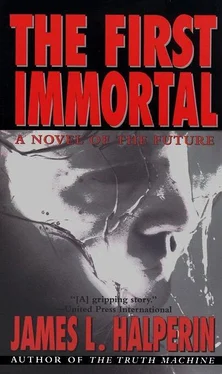“Wow. Okay, I still think she’s the same person.”
“So do I. But there’s more! Now her original brain and body are both fully dormant, and to an observer, she appears to be an unconscious woman, alongside a functioning machine that thinks it’s a woman directing a machine.”
“Uh, okay.”
“So now we reactivate her brain. She notices no difference. Then we switch her back to her normal human senses so that the machine is dormant. And we keep switching her back and forth, until she becomes accustomed to it, maybe even preferring to occupy the machine. Eventually she might decide it was irrelevant to her which vessel she occupied; perhaps if her original body were destroyed, she wouldn’t care one way or the other.”
“Fascinating idea,” Ben said, “but a little too weird for me. Obviously we can’t really do any of that stuff, right?”
“No, of course not. Not yet, anyway,” Virginia said. “I was just trying to give you another way to look at the nature of identity. But applications of this technology even weirder than Ettinger’s experiment are going to emerge. You just wait. In fact one astounding application’s ready right now. Figured out what it is, yet?”
Ben considered her question. “I can’t visualize the details yet, but this discussion seems to suggest that your process could make a person effectively, uh, immortal…”
“Bingo!” I said.
“Okay, now tell me how.”
“Well, consider how people die,” I said.
Ben’s eyes narrowed. “Never from disease or old age anymore. Only from freak accidents, or at their own hand.”
“Exactly. So wouldn’t you want your DNA pattern and memories stored off-site, on a satellite or space station somewhere, maybe even outside our solar system, just in case you, or even the whole planet, happened to get destroyed in an accident? As long as the accident didn’t destroy every last human, or the medical and scientific knowledge we’ve accumulated, then any information needed to reconstruct you would be saved.”
“You mean like a backup disc for a twentieth century computer?”
Virginia nodded. “Except that now we could simply send the information to the storage facility. Even if it’s light-years away. Do that two or three times, and the chance of simultaneously losing all stored ‘yous’ becomes incalculably small.”
“Amazing,” Ben said. Then he grinned. “Take your singularity and shove it.”
Virginia’s mouth fell open, then she grinned.
“We think there ought to be quite a market for it,” I said coyly. “Especially since the complete brain-survey process takes only ninety minutes.”
“How much would it cost?” Ben asked.
“Oh, we’ll probably charge two weeks’ earnings for it,” I said, “at least until competition from other companies drives down the price. Our first buyers will be those most able to pay; we’ll recover our costs quickly. In a negligible amount of time, anyone will be able to afford it.”
“Incredible.” Ben folded his arms, nodded and smiled. “Everyone except the cult-crazies should love this. But you didn’t have me come down here just to tell me about it, did you?”
“Not quite. Virginia and I decided that since you’re the oldest person in our family whose memories are still intact, we want you to be our inaugural Cache.”
“Cache?”
“That’s what we named the process,” Virginia said. “It means hidden reserves; like savings for a rainy day. But in this case, we’re preserving something much more valuable than money. Of all the great treasures in the universe, the most precious by far is information. Because information’s the essence of every human being, and of life itself.”
She paused, so I turned a big grin on Ben and asked him, “Well, what do you say? How’d you like to become the first immortal?”
October 20, 2098
—Seven members of the Canadian karate team are temporarily killed during a morning match against Japan. After molecular reconstruction, team captain Montgomery Paul describes his own death at the hands of world champion Akio Narato as “intensely painful, yet indescribably exciting. And no doubt it’ll be great preparation for the big one in 2308.” A spokeswoman for the Tokyo Humanism Council described today’s match as “unconscionable and borderline insane. This sort of nihilistic behavior has increased exponentially since the Nemesis discovery. The reasons, I think, are obvious.”—World presidential candidate Sven Langervist proposes doubling income tax rates from 9.5 to 19% of net income to finance a particle collider encircling the sun between the orbits of Jupiter and Saturn. “The potential benefit to humankind of such a research contrivance is unknowable, but it may lead to discoveries that will help thwart disasters from outer space,” declares the candidate, to whom AIs assign a “statistically insignificant” chance of winning next month’s election.—The World Addiction Bureau releases September’s statistics, which show a 7% drop in VR addiction over the previous month. Addiction Czar Bennett Williams declares, “This represents barely a twofold increase over the pre-Nemesis Panic rates, and nearly a 15% decline overall since July’s peak. Suicides are down by 11% as well. Obviously our programs have succeeded brilliantly.” Separately, Williams announces his intention to retire from his post early next year to lecture and write about personal motivation.
“I’m real glad I did it, Gary. Gives me a comforting feeling, almost like signing up for cryonics did in the 1980s.” Ben tried to express the ideas in terms of his own experience; a thoughtful assessment of the advantages of our Cache service, rather than a plea to his only son. He figured that if he asked his son to do it because he’d hate to ever lose him, Gary might feel pressured. Lord knew, Ben made him feel uncomfortable enough just talking about day-to-day stuff. “In some ways, it was even more soothing.”
“How so?” Gary asked, grinding his teeth. It seemed the only way to keep his father’s voice from disintegrating into white noise. Hard as it was, Gary found he wanted to listen.
“Cryonics was like insurance,” Ben explained nervously. “You knew you’d eventually need it. Did you know that after the invention of life insurance, almost a hundred years passed before it caught on?”
“Yes, I’ve read about that.” With Mnemex now added to all commercial drinking water, both men understood that reading had become the same as knowing.
“Hell, it took almost fifty years for cryonics to gain general acceptance. And today, though actuarial tables suggest the average person should have a brain-eradicating accident every 11.3 centuries, people refuse to think it can happen to them. At least not until the comets arrive. I wonder how long before Caches become the norm? Probably ten years or more. You realize how many lives it could save just in those ten years? Almost 120 million worldwide, not counting suicides.”
Gary stared back at Ben’s image on the screen and said nothing.
“Of course, back in the 1980s when I was frozen, few people were confident cryonics would work. Even I harbored doubts. Herd mentality, I guess. But now if I’m ever killed, I know they can restore me. I’ll lose whatever occurred since my last upload, of course, but I should even recover most of those memories from the archives. It really is de facto immortality, and well worth the price of admission.”
“Pretty convincing.” While Gary agreed with the concept, his father’s verbal style assaulted his ears and nerves like chalk on a blackboard. Why did the man have to put everything in terms of himself? Would it have killed him to say that he’d feel better if Gary got it done because he actually cared whether his only son lived or died? “Okay, Dad. I’ll arrange it.”
Читать дальше












